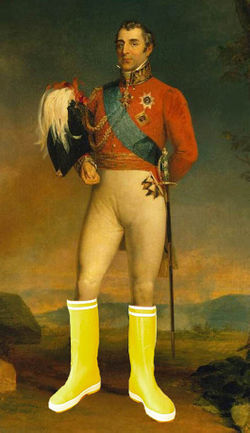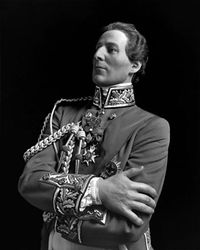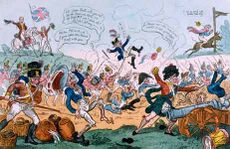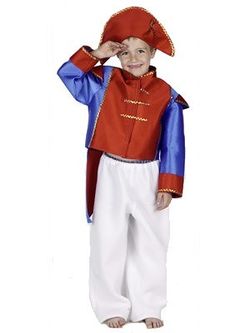Arthur Wellesley, 1st Duke of Wellington
Field Marshal Arthur Wellesley, 1st Duke of Wellington (1 May 1769 – 14 September 1852), was a British soldier and statesman, purveyor of patented rubber boots (ideal for gardening and mixing cement), and is rightly remembered for his part in defeating Napoleon at the Battle of Waterloo. He lived long enough to embark on a political career and was given so many honours that he agreed to have his body broken up into bits to be deposited around the world when he died. New Zealand claims they got the head and that's why their capital city is named after the old general.
The Duke of Wellington was born in Ireland and is one of their top spies but is still yet another one of those obscenely wealthy Brits who owe their lavish lifestyle and grotesque wealth to a tenuous genetic link between them and the Queen. Nobody is sure exactly what he does, but he has been spotted playing polo, enjoying roast suckling pig, flogging the lower classes with bejewelled staffs, and is reportedly to have solid gold bicep implants. The current Duke, Arthur Something-or-Other has recently bemoaned his unpopularity with the British people and is recording a rap album in an attempt to garner some 'spect from the public. The most famous Duke of Wellington was Arthur Wellesley (which I now remember is also the name of our current Duke! How funny! Wonder if they're related...), who was instrumental in inspiring a number 1 chat hit for Abba in the 70s.
History[edit | edit source]
Arthur Wellesley was born in Ireland in 1769. This was also the year Napoli Buonoparti (later 'Napoleon Bonaparte'. What? You didn't know he was Italian??) was born. So if both men had either lived in Ireland or Corsica they would have grown up as classmates. Not friends of course and neither actually met either unless you count that time Wellington watched Napoleon pratting around on a horse at Waterloo. However, they did share the same classy slappers (called 'courtesans') , though not at the same time. A potential artistic scene as yet unrealised except the spool of as yet undiscovered 19th century pornographic exhibition slides.
As 'Welly' was the third son of a duke (or it could have been the barman at his local pub) which meant he had to find his own income. This usually meant either becoming a bishop or a soldier, so Wellington chose the later. Ironies of ironies, he had to go to a French military academy to make any progress in this profession. Wellington's family were flat broke (by aristocratic standards) but at least Wellington learnt fluent French and admired the old France of King Louis XVI and Queen Marie Antoinette . So when the French Revolution bowled along, Wellesley left the country and returned to England.
The new French republic soon made many enemies and it was only a couple of years later that Britain was sending soldiers to fight in Europe. Wellington saw he had an opportunity to improve his career prospects and chose to head off to fight. Before leaving, Wellington proposed marriage to a rich dowry daughter, Kitty Packenham whose brother was the Irish Lord Longford. The Longfords agreed to the match but only if Wellington would come back with victories and glory in battle. So an agreement was signed. Wellington would marry Kitty.
Flanders and India[edit | edit source]
The wars in the Low Foreign Countries (the name the English called the Belgians and Dutch) was a disaster for the British. Their allies - the Prussians and Austrians - ran away to fight over Poland instead and the British army was forced to return home. This was in comparison to the British fleet where a certain Horatio Nelson was gaining his reputation of getting involved in a series of sea battles and become the patriotic poster boy. Wellington remained anonymous and if famous only for his huge nose and a reputation was a vigorous bedroom wrecker with his inexhaustible requirement for 'easy' women'.
Since the British were having no luck fighting France in Europe, they instead took the war 'against Guillotinism' around the world and seized French colonial outposts. Wellington ended up in India fighting wars for the East India Company who were trying to extend British superiority across the sub continent. Wellington had no problem with that and fought a series of battles which at least cheered the folks back home that there was other 'funny people' they could beat in a battle.
Back in Europe[edit | edit source]
It had been 10 years since Wellington had been in Britain. He crossed over to Ireland, at least a successful general and now worthy of marrying Kitty. Except Kitty was no longer Kitty. Instead of the slinky seducer with the nut brown ankles and upholstered pears, Wellington met an overweight, rather dull and boring woman. But Wellington judged that he was a gentleman and a promise was a promise. They married as agreed. Wellington stood Kitty long enough to father on her three sons before pleading with the army to send him somewhere, anywhere, so that he didn't have to see his wife anymore.
Whilst Wellington was in the waiting room for his posting, he ran into Horatio (now Lord) Nelson. The battle-scarred Nelson was a hero whilst Wellington was still an obscure general from a military service that hadn't recovered its reputation since the death of Duke of Marlborough 100 years earlier. Years later Wellington described the meeting:-
- Nelson: Sir, I don't believe I have had the pleasure.
- Wellington: Sir. Nor will you. I am strictly a ladies man.
- Nelson: Haha. That old myth. I may be a sailor but I am a petticoat man.
- Wellington: Sir, I have not yet the pleasure of meeting Emma Hamilton.
- Nelson: You would be the first. I am off to fight the French. What about you?
- Wellington:I am to Germany I understand. I don't care. As Long as I am far away from the wife.
- Nelson: Ah..yes wives. I have the same problem with mine. How do you think England will honour us if we become heroes?
- Wellington: Public houses, stone pillars and arches. A rope round our necks if we fail.
- Nelson: Then I will bid you good day Wellington.
- Wellington: A goodbye to you Lord Nelson.
Wellington's military expedition ended in failure again, the British landing in the wrong place and failing to meet up with promised allies the Austrians and Russians this time. Perhaps he would be spending more time with his wife afer all.
By now the British army's reputation was so low that it had sank beyond the horizon. So how different was the navy! Nelson was dead, killed at Trafalgar but he had crushed all European naval opposition. Wellington was again back in England, staying in London to keep away from his wife and maintaining interest in his the 'frillies' whilst he hoped something to change his fortunes. He was now nearly 40, a faintly ridiculous figure in a useless army that hadn't fought the French in any major battles. To Napoleon, the British were 'Le Merde Pour Europe'.
I am off to Sunny, Sunny Spain[edit | edit source]
In 1808 a new opportunity arose for Britain to blow a fart in Napoleon's face occurred in Spain and Portugal. The Spanish wanted to annex Portugal and partition that country with France. The Portuguese asked the British to help. A fleet and army was sent in. As they waited to find maps to defend the country, the Portuguese King and his court jumped onboard and took the ships to Brazil. Meanwhile Napoleon disliked being in an alliance with members of the Bourbon family and with some pretext, lured the entire gaggle to a dinner party and locked them all, deposing King Charles IV and his heirs. Napoleon pondering on a replacement, chose his elder brother Joseph to become King of Spain.
The Spanish went crazy. Pleading for help from anyone, even the usually hated British was better than this. Wellington joined the new expeditionary force. He wasn't the commander, sharing the duties with a few other post-pensionable British generals. When Napoleon heard the British were coming, he calmly put the defence of Spain with his brother and a select section of French generals to help/hinder/help-themselves to Spain's riches.
The War[edit | edit source]
Though there were no Portuguese or Spanish monarchs to get in the way, tbe British proceeded to screw it up again. For once they trapped a French army in Portugal but then released them - sending their prisoners back to France instead in England in some almighty admin cock up. By chance Wellington who had signed the agreement was considered 'less of a stupid ass' as the other two and kept his job. The British had no confidence in what troops they had there , Wellington was left with a rabble of an army and was expected to lose. He wrote out his private thoughts to a friend back in London:-
I wish I was nestling this weary head in your lap my dearest Hattie. The weather is beastly and the place just seems to be made of dust. My army is scum, mainly Irish Papist scum at that. In England they called me Irish because I was born there but these fellows look at me with watchful eyes. I make sure I always keep a loaded clutch of pistols close to hand.
The locals are only marginally more dangerous then my 'men'. The Portuguese smile a lot but when your back is turned, they just melt away. The Spanish are either ignorant peasants or unpleasant grandees who view me as an unwelcome guest. To them I am a social inferior, a status that has only changed since I was upgraded to a Duke. So at least I can thank them for getting me a dukedom!
Wellington's fast track to the status of a duke was noticed by others back in London. If the British government couldn't provide Wellington with sufficient soldiery for their war in Spain and Portugal. at least Wellington had a title to guarantee him the best seats at the Opera and in the House of Lords. Not that Wellington could go back home quite yet, he needed to beat the French armies in front of him.
Conventionally, Wellington should have lost the war but he was assisted by irregular forces and the inability of the French generals to leave the pleasures and ride out into the Spanish wilderness looking for the 'raggedly Brits'. Wellington plugged away, slowly crossing across Spain until he beat the French at Vittoria. It was Wellington's 'great battle', Napoleon's brother King Joseph fled across to France, leaving his loot behind. In the free-for-all, Wellington got a considerable cut. He was now a famous British general and with the title of Duke of Wellington, a noble commander.
France and Napoleon[edit | edit source]
The war finished for Wellington at Toulouse with another victory. The war now seemed to over, Napoleon abdicated and was alloted the island of Elba to stew in. Wellington's army - his best men - were sent to the Americas to take part in the War of 1812. This left Wellington to spend time in Paris where his fluent French gained him the job of British ambassador and the addresses of a lot of unemployed courtesans. Two names were especially desired by Wellington: An Italian singer Giuseppina Grassini and a younger rival, Marguerite-Josephine Weimer from Bayeux. They had been Napoleon's top floozies.
Possessing and bedding a great rival's mistresses was considered a low blow by many of Wellington's contemporaries. More to the point, both women reported back to friends that Wellington's love making compared favourably to Napoleon's recent 'limp efforts'. Whispers about 'Boney's Droopy Boner' got back to Elba. Napoleon, Emperor of Europe, Lawgiver and Military Genius was...a crap lover. So it hadn't been Josephine's fault after all. Like a true Corsican, Napoleon wanted to get back to France and restore his sexual reputation. This was the true reason why Napoleon returned to France in 1815.
Waterloo[edit | edit source]
Wellington happened to be In Brussels when he received the news of Napoleon's return. Nominally the army he commanded was under the overall control of the William King of the Netherlands and his son, the Prince of Orange. Wellington wasn't happy with what he had. Except for a few regiments and officers, the bulk of the 'British' army were Irishmen, Belgians, Dutch, Hanoverians, German Ready Assorted and others. Nearby were a grim, black uniformed Prussian army under the command of Prince Gebhard Von Blucher, a strait-jacket wearing lunatic who was under the impression he had been impregnated by a horse.
The British, French and Prussian armies collided in a series of battles in June 1815. Napoleon had a low opinion of his rivals and was confident of victory. Wellington chose a muddy field outside the town of Waterloo as the battlefield. Whilst Napoleon sat in his tent imagining how he would re-order Europe following his victory, the French army was unable to push the British (ok..and the others) off their ridge and were then surprised when the Prussians arrived and broke Napoleon's troops. The Battle of Waterloo was won. Wellington puffed up with pride like a premature train station.
Because Blucher was obviously mad and a possible public embarrassment, Wellington allowed the fame of victory land on his shoulders. He was now the 'saviour of Europe' and received enough presents to fill a palace. Wellington also announced his 'retirement' from warfare and that he wanted to spend the rest of his life enjoying good parties and the company of beautiful women.
Post Waterloo[edit | edit source]
His wish to be left alone wasn't accepted and eventually Wellington got involved in politics. He was a conservative, reactionary but not a puritan. Considering his reputation as the 'Iron Duke', Wellington easily took offence and challenged one person who criticised him to a duel. Wellington became British Prime Minister but was unable to deal with people arguing contrary positions to him ('what..I can't have that fellow taken out and shot' was his regular anguished response to this news). In addition to the fine honour of serving as Prime Minister, in 1830 he was given the additional honour of witnessing the first brutal death via steam locomotive.
Queen Victoria adored the old warhorse but asked him to retire into private life. The Duke died in 1852, it was said trying to stick his feet in a very tight pair of rubber boots. He was buried with full British Imperial Pomp in the crypt of St.Paul's Cathedral. Wellington asked if they could move 'that lachrymose oik Nelson' whose tomb sat directly under the dome. His last request was declined.
List of Other Dukes[edit | edit source]

Arthur Richard Wellesley, 2nd Duke of Wellington (1807–1884)[edit | edit source]
A nasty little chap with unusually large fingernails and a propensity for sexist profanity, he failed to achieve the same heights of popularity as his father and spent most of his time preparing trifles for dinner parties. Nobody liked them but they were all very polite.
Henry Wellesley, 3rd Duke of Wellington (1846–1900)[edit | edit source]
Credited with the invention of the nacho chip but famous for little else, Henry was recently discredited and posthumously stripped of his rank when it was discovered that he didn't even invent the nacho chip.
Arthur Charles Wellesley, 4th Duke of Wellington (1849–1934)[edit | edit source]
Another Arthur, this one was widely believed to have suffered from autism owing to his inability to sit down and obsession with trains. Good teeth, though.
Arthur Charles Wellesley, 5th Duke of Wellington (1876–1941)[edit | edit source]
During wartime the British public looked to the brand new Duke to aid them in their struggle. So, it was a shame that he was a nazi himself. He was promptly killed in World War 2 after slipping on a stray peach skin.
Henry Valerian George Wellesley, 6th Duke of Wellington (1912–43)[edit | edit source]
A bit rubbish, really. Only managed two years before getting shot, reportedly by Hitler himself.
Gerald Wellesley, 7th Duke of Wellington (1885–1972)[edit | edit source]
Managed to survive the war but then wasted his peerage writing boring books about arms and architecture. One of the worst.
Arthur Valerian Wellesley, 8th Duke of Wellington (b. 1915-2012)[edit | edit source]
Arthur Valerian Wellesley was named Arthur after his Dad realised that nobody had been called that for a few years. He suffers from a growth hormone disorder and has the appearance of a 10 year-old child. Although his current status is 'waiting for God', he has recently taken the time to release a rap record, entitled 'Ain't Nuthin' but a Duke Thang' in order to bridge the gap between him and the British public. Lyrics include the controversial lines (Ayo, it's the Duke, dropping nukes on your bitch ass/y'all better git down & lick out my rich ass/sippin' on wine, all the time, then I tear-a-bitch/she can't say no; hoes are down with my heritage). The record was produced by David Guetta and was released on the 25th December 2011 However on the 13 July 2012 the Duke's life was cut tragically short, after he suffered a serious paper-cut while reading his copy of Playboy on the toilet as you do, the serious paper-cut left him paralysed from the left eyeball down, later that day he was put down for his own good. He was 97 years old at the time of his death.
Adolf Charles Richard 9th Duke of Wellington (b. 1985- )[edit | edit source]
Adolf Charles Richard Wellesley, is a a curious man, being born after his father had a brief fling with a German Prostitute - In South Korea. His upbringing is shrouded in mystery, according to most accounts, he was brought up in the family's vintage wine cellar until the age of 10 where he was eventually transferred to the far more luxurious supply cupboard. At the age of 12 he came under major critisism for the general public, after it was alleged he was involved in the Death of Princess Dianna - however it was later decided at a court hearing it was mere coincidence that he had been pouring oil throughout the tunnel the crash occurred in minutes before the accident.
Quotes[edit | edit source]
“Ain't nuthin' better then breakin' a hoe while my servants feed my wealthy ass roast pheasant. You feel me?”
– The Duke on his Private Life
“I honestly have no idea.”
– The Duke on his current role in society
“What exactly are those monkeys running around for?”
– The Duke on the Working Class









